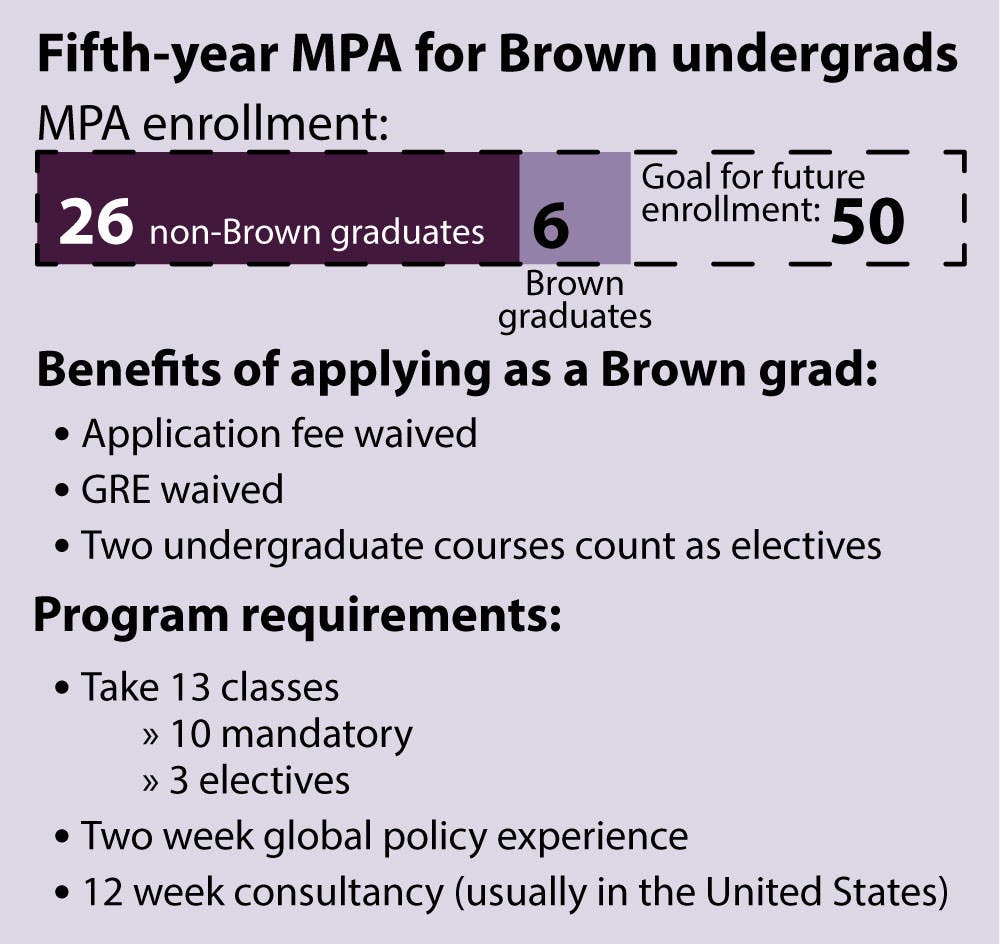The Watson Institute for International and Public Affairs is in its first recruitment cycle for Brown undergraduates hoping to continue their Brown experience with a fifth-year Master in Public Affairs.
Restructured and launched two years ago, the one-year MPA program includes graduate classes at Brown, a 12-week work experience at a policy organization and a two-week Global Policy Experience abroad. The new fifth-year MPA program allows for a smoother transition into the program for Brown undergraduates.
Unlike regular applicants to the program, Brown undergraduate applicants have their GRE requirement and application fee waived and can count two approved undergraduate courses toward the three MPA electives. These two courses cost around $6,500 each, which is subtracted from the overall cost of the fifth-year MPA for Brown undergraduates and can be combined with merit-based financial aid, wrote Associate Director of Public Policy Carrie Nordlund in a follow-up email to The Herald. All MPA students, including fifth-year MPA students, receive some form of aid, which varies depending on a student’s financial situation, Nordlund wrote.
Brown is the only school in the Ivy League to offer a one-year MPA, which was condensed from a two-year to a one-year program during Watson’s reorganization, said Eric Patashnik, director of the public policy program and professor of public policy and political science. “The one-year MPA is a tremendous opportunity to gain professional skill” in problem-solving, management and networking, which are “competencies that are in growing demand in the public policy sector,” Patashnik said.
The Watson Institute’s program is unusual in its high student-to-faculty ratio. With 32 students enrolled this year, the program is expected to grow to nearly 50 students within the next few years, Patashnik said. The small class size helps foster a “close-knit community featuring many opportunities for students to work with faculty, pursue a specialization in an area of policy interest and obtain individualized career coaching,” Patashnik added.
Nordlund highlighted the program’s mandatory Global Policy Experience component, small class sizes and guest speakers as important parts of the program. The curriculum emphasizes professional writing such as memos and speech writing. “We’re not (only) training you in a specific topic but also in these transferable skills that employers are looking for,” Nordlund said.
Common concentrations for undergraduate applicants include political science, public policy, international relations and economics, Nordlund said.
“As an undergrad, a lot of what I learned was theoretical. The MPA program was more about marketable skills that I could apply to something,” said Pearson Potts ’16 GS, an MPA student.
In public policy, “it can seem like the master’s is the new bachelor’s,” said Robyn Sundlee ’16 GS, also an MPA student.
Students involved in the program typically are interested in applying public policy to address a variety of issues. “The students are coming to the program with a full range of interests, from poverty to health to women’s rights to cybersecurity,” Patashnik said.
For the Global Policy Experience component this year, students traveled to Cambodia, South Korea and Sweden, where they met with government officials and diplomats, Patashnik added.
Correction: A previous version of this article contained a misspelling of Associate Director of Public Policy Carrie Nordlund's name. The Herald regrets the error.





